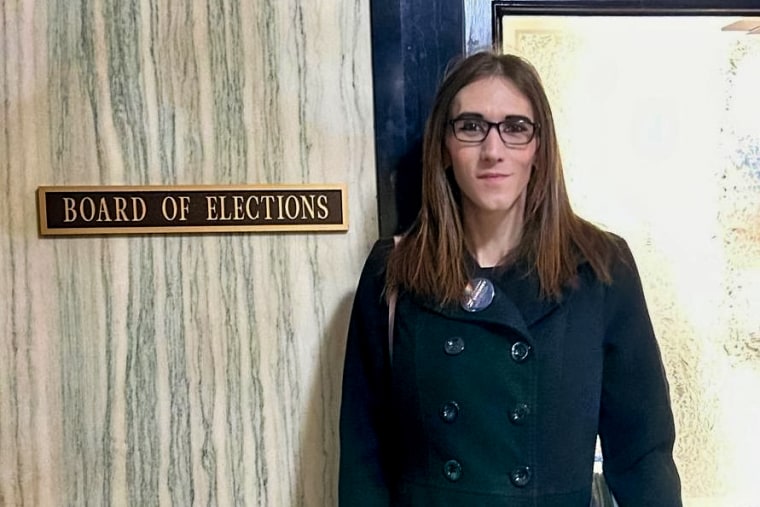
A second transgender woman’s petition to run for the Ohio House of Representatives is being challenged because she did not disclose her birth name, according to Ohio election officials.
Arienne Childrey, 41, of St. Mary’s, which is about 100 miles northwest of Columbus, is the sole Democrat to attempt a run for Ohio’s 84th House District seat. But Mercer County Republican Party Chair Robert Hibner asked the county’s board of elections to reject a campaign petition filed by Childrey last week, county Board of Elections Director Deb Sneddon told NBC News on Tuesday.

Hibner alleged that Childrey’s petition violated Ohio law, which requires people running for political office who have changed their name within the last five years to include their former names on candidacy petitions, Sneddon confirmed. The law, which was enacted in 1995, exempts people who have changed their name because of marriage, but it does not mention exemptions for trans people who change their names.
The challenge to Childrey’s candidacy comes a week after another trans woman — real estate photographer Vanessa Joy — was disqualified from running for a separate seat in the Ohio House for violating the same law by not disclosing her former name.
“As they’re actively attacking us, they certainly want to ensure that we don’t get an opportunity to hold any of the same power that they hold,” Childrey said Thursday, referring to state Republicans’ actions toward transgender people.
Hibner did not immediately return a request for comment. Sneddon referred NBC News to an attorney for the Mercer County Board of Elections regarding Childrey’s accusations that her candidacy is being challenged because she is transgender.
“I have not followed the accusations closely enough to understand what they are,” the lawyer, Amy Ikerd, said in a phone call. “We’re just trying to follow the statute and keep the politics out of this as much as we can.”
Joy’s petition to run as a Democrat and represent Ohio’s 50th House District was rejected last week, a decision she said she would challenge. In an email, Melanie Amato, a spokesperson for Ohio Secretary of State Frank LaRose, suggested that Joy’s disqualification was warranted and called criticisms of her disqualification “unfair.”
Joy then said that had she known she needed to include her birth name — or what’s sometimes referred to as a “deadname,” the name a trans person no longer uses after they transition genders — she would have done so.
Childrey, who works in retail, also said she would have included her birth name had she been aware that she was required to do so.
“Having to use your deadname is horrible. It is an attack on who we are,” she said. “But would I have put it down because the goal to me is more important than my personal pride? Hell yes, I would have.”
The challenge to Childrey’s candidacy comes as Ohio lawmakers have made national headlines over trans issues in recent weeks.
Ohio Gov. Mike DeWine, a Republican, went against members of his party last month, vetoing a bill that would have broadly prohibited transition-related care for minors in the state. Instead, the governor signed an executive order last week that would specifically ban transition-related surgeries for minors, which are rare and generally not recommended by major medical associations.
DeWine’s veto of the original legislation is expected to be challenged by members of his party this month.
Childrey said she decided to run for office in response to the legislation and several others introduced by Republican lawmakers in the state in recent years, including by her district’s current representative whom she is challenging, Ohio state Rep. Angela King.
“If you’re going to talk about us and make laws about us, then you’re going to have to compete with us,” Childrey said,
Ohio has only one trans elected official serving in the state, Dion Manley, a school board member in Gahanna, a Columbus suburb, according to the LGBTQ+ Victory Institute, a political action group that aims to elect LGBTQ candidates to government. Nationwide, there are 51 elected officials who identify as trans women, trans men or trans nonbinary people, with only eight of them serving in state Legislatures and none holding federal office.
In addition to Childrey and Joy, two other trans people filed to run for the state’s Legislature, according to the local outlet Cleveland.com.
Childrey said she will try to run for public office again in future elections if her candidacy is ultimately disqualified.
“The best that the local Republican can hope from this is that they postpone having to face me,” she said.

 Latest Breaking News Online News Portal
Latest Breaking News Online News Portal




